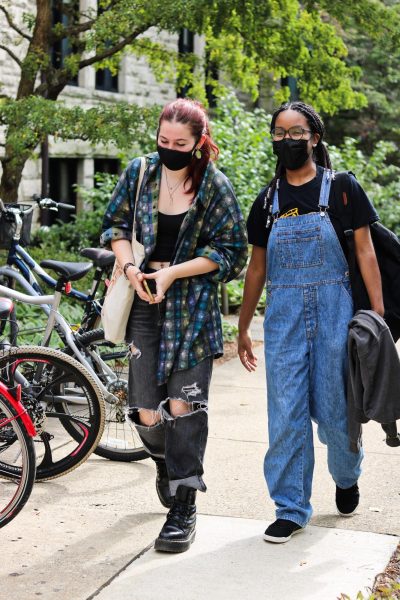Oberlin’s COVID-19 Policies Unclear, Insufficient
During the summer semester, there has only been one confirmed case of COVID-19 on Oberlin’s campus. This achievement, while impressive, is perhaps boosted by the fact that the College has discontinued its testing regimen. It’s difficult to find something you’re not looking for.
When the Office of the President sent out the email last week announcing the first confirmed case of the semester, it was infused with the familiar self-congratulatory language that I have come to expect from ObieSafe updates and College communications. Indeed, the low case numbers on campus this year have been impressive. In the fall, I felt that I was in a much safer environment than my parents and friends from home, many of whom study and work at universities that declined to ever incorporate mandatory testing, adequate masking, or quarantining in the event that a student tested positive. Our low rate of positive tests during the fall and spring was a direct result of Oberlin’s implementation of these measures.
When vaccines became widely available, Oberlin kept the campus updated on the overall student, faculty, and staff vaccination rate and encouraged students to get vaccinated. Obies got vaccinated en masse, with students currently on-campus achieving a 93 percent vaccination rate as of Aug. 2, enough for the College to lift most COVID-19 protocols. Unfortunately, the College also chose to lift the mandatory campus-wide testing regimen — perhaps the only metric by which the College could collect data on whether or not lifting these restrictions was successful. One of the most dangerous things about COVID-19 is that you can be infected yet asymptomatic. That’s something that we learned quickly at the beginning of the pandemic, and yet seem to have forgotten
I believe that the College made the right choice at the start of the summer semester by resuming in-person classes, lifting the mask mandate, and allowing many in-person activities to resume. I could see the effects of these changes on my own mental health and the mental health of those around me. I learned better from in-person classes, new friendships flourished, and I no longer felt the presence of COVID-19 anxiety as a constant companion.
I wish we could have held onto that progress. Because there is no data, I don’t know if the Delta variant is becoming a turning point in the spread of COVID-19 at Oberlin. I don’t know if events like Solstice affect transmission on campus. I can’t be sure if it’s less safe to be dining inside than it was a month ago, because I simply don’t know who around me might have COVID-19 and not know it, or know they have it and are not quarantining. And so that nagging, anxious voice is back. The thing that the College did that made me feel the most safe during the fall semester was communicating regularly. I remember sitting in the Zoom call for my poetry class every Tuesday, and like clockwork someone would announce that the latest ObieSafe email said we had few — often zero — positive tests that week. And that made me feel like I knew what was going on, like I could make informed decisions instead of flailing blindly in the dark.
While the College has released some communications and FAQs outlining their reasoning behind certain decisions, there are essentially no numbers regarding COVID-19 cases on campus, although Oberlin’s choice to resume mandatory masking suggests that I should be worried about contracting COVID-19. While I know that only one student has tested positive, I also know that people potentially exposed to the individual weren’t required to quarantine, and even if they chose to, were not necessarily provided with support from the College. The process by which I can get a COVID-19 test from the College also hasn’t been communicated clearly. Before going on a trip to see my family, I was able to get tested at a CVS that was a 20-minute drive away, and during the drive I felt lucky that I had a kind friend with a car. I didn’t know at the time that if I wanted a COVID-19 test, I could contact Student Health.
I recognize that the College is changing its COVID-19 policy for the summer semester on the fly. It is difficult to implement mass-policy changes such as campus-wide COVID-19 testing. And while the College, in my opinion, should never have stopped testing, they can still bring it back. Requiring students to be vaccinated for the fall semester is a good start; however, like testing for COVID-19, the College should provide avenues through which students can get the vaccine. The College should also resume mandatory monthly testing for the fall semester, while providing students with the resources to quarantine if they need to. Knowledge and communication is the most powerful tool we have to combat COVID-19; it provides both students and the College with the ability to make informed decisions while also helping ease some of the anxiety caused by the uncertainty surrounding COVID-19. Testing was one of the College’s most valuable tools against the transmission of COVID-19, and they need to bring it back.




